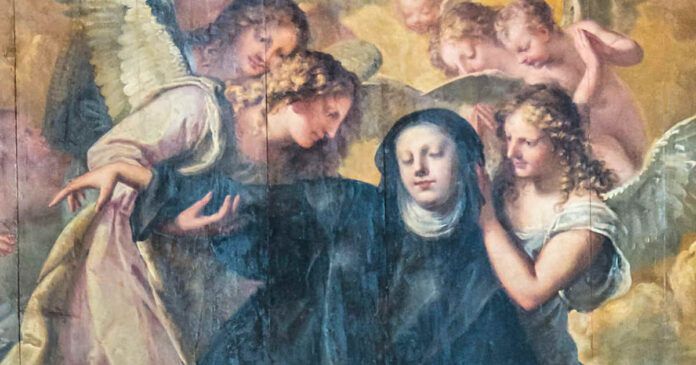Saint Gertrude is the only female saint to be called “the Great.” She was a woman of vast knowledge and deep intelligence. She spent most of her youth dedicating herself to her own education. Eventually, she experienced a deep conversion which led her to dedicate the rest of her life to God. Her feast day is being celebrated on November 16.
Gertrude of Helfta was a highly intelligent woman. She was born on 6 January 1256 in Eisleben in Thuringia. At age of 5, Gertrude went to the Cistercian monastery school of Helfta in Saxony, and since then has always been known as “Gertrude of Helfta”. She has been very studious.
While in the monastery, she had the opportunity to obtain a deep and personal knowledge of Jesus Christ. She could discover the beauty of living for Christ and with him in the intimacy of love. But the divine Teacher for some time remained in the background as she used all her faculties to improve her education, becoming proficient in literature, philosophy, music, and the refined art of miniature painting.
Several years later, Gertrude moved from the monastery school to the novitiate, accepted the habit and became a nun. For her Jesus was “Someone”, but her studies were still her all-in all. But she was not on a wrong track, for knowledge, when it goes hand in hand with humility, does not distance people from God. And Christ was waiting on her way.
In 1280, she was 24 years old, but a half-hearted and distracted nun. She happened to go through some inner crises and loneliness. Gradually she became convinced that her human plans were only a golden calf.
On 27 January 1281, Gertrude had vision of Jesus in person in the form of a marvelous adolescent who told her, “I have come to comfort you and bring you salvation”. Remembering that day, she writes: “Jesus, my Redeemer, you have lowered my indomitable head to your gentle yoke, preparing for me the medicine suited to my weakness”. From that moment itself, she decided to live in full union with Jesus.
It was exactly on 23 June 1281 and in her writings she calls it as the newfound unity with Christ.
She abandoned the study of other subjects and started learning Scripture, writings of the Church Fathers, and theological treatises. She found extraordinary delight in reading the letters of Augustine, Gregory the Great, Bernard and Hugh of Saint-Victor.
From a scholar specialized in the humanities, she became a “theologian” filled with God and His fragrance. Her life seemed to be truly filled with the Lord alone.
But Gertrude did not want to be the only one to enjoy this supreme “Pleasure”; so she began to write short treatises for the Sisters in the monastery and those who approached her; in them she explained the most difficult passages of Scripture, true spiritual treasures written in a clear and lively style.
The parlor of the monastery was also often full of people who came in search of her words, consolation and guidance. She exercised a great influence on their spirituality.
Since her conversion, the infinite Love of Jesus’ Divine Heart charged her to inspire human beings with love for suffering and for sinners. Gertrude’s ecstasies with Jesus prompted her to write those fervent pages that would bring souls to him.
Gertrude always humble, happy, and smiling, and with a loving heart for all, sparkled with trust, joy and peace, and led everyone to the Lord. To her soul, Jesus was like a spring day, vibrant with life and scented with flowers: Love par excellence, the one overwhelming Love. This is why she is known, on the one hand as the “Teresa of Germany” and on the other, the “theologian of the Sacred Heart”.
One day, Jesus said to Gertrude: “It would be good to make known to men and women how they would benefit from remembering that I, the Son of God and of the Blessed Virgin Mary, always stand before God for the salvation of the human race, and that should they commit some sin through their weakness, I offer my unblemished Heart to the Father for them”.
She truly became one with Jesus, and transmitted him to her brethren in the many works she has bequeathed to us, some of which have been lost.
In 1298 her health deteriorated, but she transformed her sufferings into love, an offering with Jesus to the Father and a gift for humankind.



